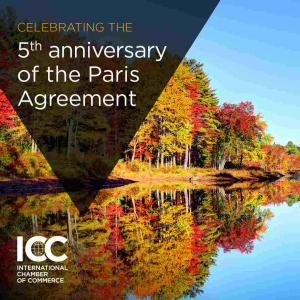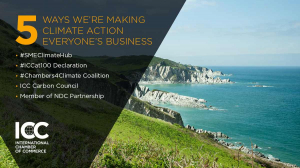
Climate change
ICC celebrates the 5th anniversary of the Paris Agreement
Since the signing of the Paris Agreement in 2015, the International Chamber of Commerce (ICC) has been helping businesses take bold climate action and working with governments and other stakeholders to support people and planet.
Having played a central role in the delivery of the Paris Agreement and in shaping the United Nations Sustainable Development Goals (SDGs), ICC is committed to advocating for coherent policy frameworks in line with the latest science. As the institutional representative of 45 million companies worldwide, ICC recognises the urgent need to keep the rise in global temperature to 1.5°C and achieve net-zero emissions by 2050.
To mark the 5th anniversary of the signing of the Paris Agreement, here are five ways ICC has made climate action everyone’s business, five ways governments can support people and planet, and five reasons for businesses to take climate action.

Five ways ICC has made climate action everyone’s business
- ICC Declaration on the next century of global business
The ICC Centenary Declaration, issued in May 2019 by ICC Secretary General John W.H. Denton AO, recognised the urgent need to respond to the growing climate emergency and endorsed the Intergovernmental Panel on Climate Change (IPCC) Special Report on Global Warming of 1.5°C.
- SME Climate Hub
The SME Climate Hub is a one-stop shop providing micro-, small- and medium-sized enterprises with tools and resources to curb emissions and gain a competitive advantage. Launched during the 2020 New York Climate Week, the SME Climate Hub is co-hosted by ICC, the Exponential Roadmap Initiative, the We Mean Business coalition and the United Nations Race to Zero campaign. If you’re an SME business owner, make the SME Climate Commitment today and start taking action using the tools we have curated with the University of Oxford.
- Chambers Climate Coalition
The Chambers Climate Coalition is an unprecedented grassroots mobilisation of over 2,100 chambers of commerce – representing over 10 million local business leaders – committed to climate action. The Coalition has been recognised by the United Nations Race to Zero campaign for supporting the objective of achieving net zero emissions by 2050 to meet the Paris Agreement’s overarching objective.
- ICC Carbon Council
ICC established the ICC Carbon Council to create effective market-based mechanisms to create greater liquidity, transparency, accessibility, and standardisation in carbon markets. The inaugural meeting – held on the 50th anniversary of Earth Day – gathered major international firms, including Blackrock, BP, Macquarie Bank, RGE, Shell, Singapore Airlines, State Street, Temask, and others.
- Member of The NDC Partnership
ICC is the only private sector member of the NDC Partnership – a group of national governments, international institutions, civil society, researchers, and the private sector committed to fast-tracking climate and development action. As the United Nations Framework Convention on Climate Change (UNFCCC) Focal Point for Business and Industry, ICC explores how businesses can assist governments to develop, shape, and implement their nationally determined contributions (also known as NDCs).

Five ways governments can support people and planet
- Keep climate change high on the political agenda
In responding to the COVID-19 pandemic, policymakers should not forget the importance of sustainable and inclusive recovery for all. If we are to avoid a climate crisis, there is only one way forward – deliberate and ambitious climate action on a global scale. Read ICC Secretary General John W.H. Denton AO’s call to governments.
- Align COVID-19 recovery efforts with the imperative of climate action
ICC joined 13 other international organisations to issue a call to government leaders to renew global cooperation and deliver an inclusive and resilient recovery from the COVID-19 pandemic. The statement called on policymakers to lead the world on climate action and reverse nature loss as part of the economic recovery process.
- Work with businesses of all sizes, sectors, and geographies
Governments should work together with business in the development and implementation of climate change policy at national and international levels given the role of business as a key actor and source of experience, advice and resources in tackling climate change while also increasing competitiveness, creating jobs and promoting sustainable economic growth.
- De-risk flows of private capital into climate change adaptation and mitigation investment opportunities
Governments, financial institutions, and banks can take concrete steps to create an enabling environment for businesses to take climate action. ICC is developing a policy paper outlining financial incentives and regulatory measures governments can take to encourage businesses to encourage sustainable innovation. Read ICC Secretary General’s letter to finance ministers at COP25.
- Reach a conclusion on the implementation of Article 6 of the Paris Agreement
Business supports market-based approaches aligned with the Paris Agreement. By implementing Article 6 of the Paris Agreement, governments have the opportunity to drive enhanced ambition and set an effective framework for carbon pricing that will contribute to sustainable development.

Five reasons for businesses to take climate action
- Gain a competitive advantage
Investors, shareholders, consumers, and employees are increasingly looking to business to adopt ambitious climate-related targets. By establishing climate action at the core of their operations, businesses can gain a competitive advantage in their sector and industry.
- Manage business risk
Climate change can represent material risk to business cash flows and economic growth, by increasing operating costs, limiting resource availability, causing shifts in demand, and disrupting supply chains. If left unchecked, climate change will lead to widespread business closures.
- Improve efficiency
Businesses that use and manage their resources more efficiently can tangibly reduce their operating costs and increase profitability, while improving business preparedness.
- Enhance access to capital and affordable insurance
Investors and insurers are increasingly linking business exposure to natural disasters with climate change. Take steps to keep your insurance fees affordable and secure your loan, grant, and investment worthiness.
- Inspire your employees
Faced with the consequences of climate change, employees are increasingly demanding that their companies incorporate sustainable and inclusive practices into their business models. Demonstrate to your employees that your company takes the urgent need to respond to the growing climate crisis seriously.

BONUS: Five things to check out while celebrating the 5th anniversary of the Paris Agreement
- Webinar on Climate Action with Nigel Topping and Gonzalo Munoz
Watch UN High Level Climate Champions for the UK and Chile, Nigel Topping and Gonzalo Muñoz, kick off Climate Week NYC and introduce the SME Climate Hub.
- Trading Thoughts with Paul Polman
ICC spoke with Paul Polman, Honorary ICC Chair and Co-founder of Imagine, about the building back better from the COVID-19 pandemic toward a green economic recovery.
- Trading Thoughts with Mary Robinson
Mary Robinson, the former President of Ireland and UN High Commissioner for Human Rights, joined ICC to discuss COVID-19’s impact on small businesses and climate change.
- Webinars on the implementation of Article 6
Watch this two-part webinar on the background and state of play of Article 6 negotiations and its current implementation efforts.
- Webinar on Climate Science with International Panel on Climate Change IPCC
In this webinar, ICC and the Intergovernmental Panel on Climate Change (IPCC) discuss the climate science behind IPCC’s latest reports.
